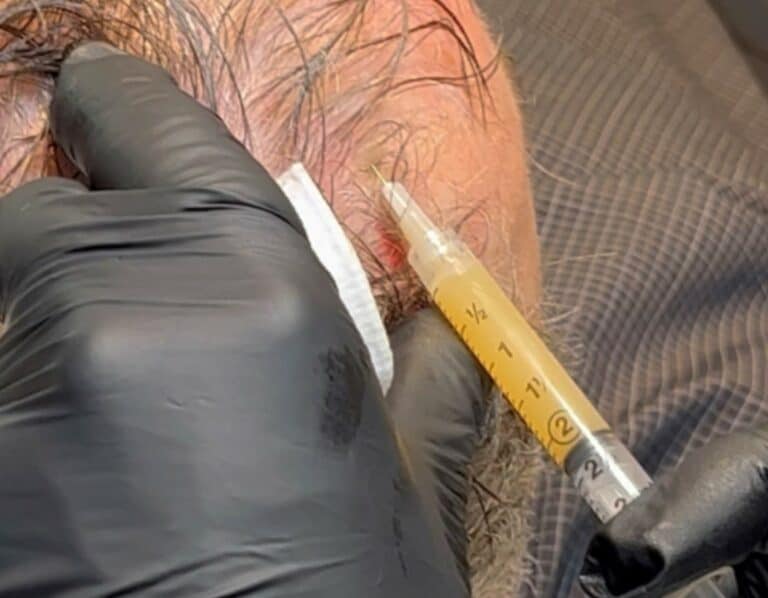Hair loss can hit you hard, regardless of your age or gender. It’s one of the most distressing physical changes a human can go through in their life, and it’s doubly so if your hair was always a point of pride.
If you’re suffering from hair loss, though, we want you to know there are many treatments available. In this post, we’ll explain the different types of hair loss, and go over the potential treatments worth trying, including some of the incredibly successful solutions we offer here at Discovery Laser.
Types of Hair Loss
Identifying the type of hair loss you have is so important, because most treatments are not one-size-fits-all. Additionally, with some types of hair loss, you might also need to treat the underlying cause first.
- Androgenetic hair loss is also known as pattern hair loss, and it’s incredibly common yet distressing. It’s caused by hormonal changes that are often genetic, and related to age. In women, it can also be a sign of a hormonal disorder like PCOS.
- Alopecia areata (often simply called alopecia) is an autoimmune disease where the body’s immune cells attack the hair follicle.
- Telogen effluvium is temporary shedding when many hair follicles suddenly and all at once enter their shedding stage. It’s often related to stress, illness, physical trauma, post-pregnancy, or certain nutritional deficiencies. In many cases, it can resolve once the unlderying reason for it is addressed.
- Traction alopecia is caused by stress to the hair follicles, usually because of very tight hairstyles.
- Irritation or inflammation can damage the hair follicles, preventing hair growth.
Hair Loss Treatments
From topical medications to clinical treatments and surgery, there are a lot of ways to deal with hair loss. Often, combining a few treatments actually guarantees better results, especially if you’re dealing with difficult-to-treat pattern hair loss.
Hair Loss Medications
There are a few hair loss medications that can help improve hair density. The most common one is minoxidil, which is sold over the counter in Canada as a topical treatment, often under the brand name Rogaine. Minoxidil stimulates hair growth, and it’s effective for pattern hair loss, especially when it’s combined with microneedling treatments that improve absorption. It can also work for other types of hair loss, like alopecia areata.
Another commonly prescribed medication for hormonal hair loss is finasteride, which is taken orally. It’s a hormonal medication that blocks the conversion of testosterone into the type of male hormone responsible for hair loss. It works especially well for men but for women experiencing hair loss, the results are mixed.
When considering hair loss medication, it’s so important to speak to your doctor first. You want to be well aware of the potential side effects and rule out any potential contraindications.
Minimally-Invasive Hair Restoration: PRP, Exosomes, and More
PRP hair restoration is one of the most fascinating modern treatments for hair loss. It’s a non-surgical, minimally-invasive treatment where the body’s own platelet-rich plasma is injected into the scalp.
The platelets contain incredible amounts of growth factors that kick the hair follicles into action and help them produce more hair, while white blood cells are the body’s natural anti-inflammatories that ensure a beneficial response.
PRP is one of the best hair loss treatments for women and men experiencing pattern hair loss, but some research suggests it’s even effective for other types of hair loss, like alopecia areata and telogen effluvium.
At Discovery Laser, we combine PRP with our Dp4 Dermapen microneedling treatment, to ensure a better and more targeted distribution of PRP throughout the scalp when compared to injection.
To maintain the results, we combine less invasive technologies that help prevent hair loss from recurring, including using synthetic growth factors called Exosomes, or using Jetpeel instead of microneedling to deliver PRP or other growth-stimulating actives directly into the scalp with air pressure.
Hair Transplant Surgery
Hair transplant surgery is considered the most invasive treatment option for hair loss, but it’s also incredibly effective. During hair transplants, hair follicles are removed from one part of the head and inserted into the area where hair loss is pronounced. The surgery is done under local anesthetic, and the healing process can be somewhat painful and awkward. However, the high success rate often makes the difficult healing stage worthwhile.
Transplant surgery is a suitable treatment for pattern hair loss, as long as there are other parts of the head where there is a lot of hair. It won’t work as well for more diffused hair loss where there aren’t sufficient “donor” hair follicles.
Recently, some surgeons also recommend introducing PRP post-surgery, as a way of improving the healing process and ensuring better outcomes.
Do Women Need a Different Hair Loss Treatment?
Unfortunately, most research on hair loss treatments is conducted on men rather than women. Women often don’t respond as well to the same treatments, or they require longer treatment periods.
Additionally, women are more likely to have types of hair loss like telogen effluvium, which are also less well-researched than pattern hair loss, and often require treatment of the underlying cause. Even so, PRP and minoxidil can both be effective hair loss treatments for women since they stimulate the hair follicle directly.
A Fuller Head of Hair With Discovery
Hair loss can be distressing, but just starting the treatment process will offer you immense relief. If you’ve already tried the commonly prescribed treatments and you’re ready to see faster results, we’d love to be part of that transformative journey.
At Discovery Laser, we believe in a forward-thinking approach to care. When you come for a consultation, we’ll talk you through your options and recommend the hair loss regimen that’ll make the most sense for you. We’ll also recommend a long-term strategy that’s accessible and will help you prevent any relapse, so you can maintain that full head of hair in the years to come.


